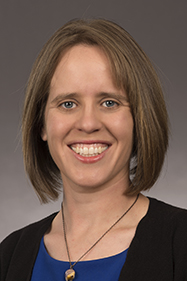Faculty
Professors | Lecturers | Affiliate | Postdocs | Emeritus

Professors

Kinta Serve, D.A.
Associate Professor
Cell Biology & Immunotoxicology
Office: Life Sciences 207
Research
Lab: Life Sciences 327
My research focuses on immunotoxicology, or how toxins disrupt normal immune system functions. Specifically, I examine the effects of asbestos fibers (found both commercially and naturally in the environment) on immune cell function. My work also examines the role of certain asbestos types in driving autoimmune responses in humans and mice, responses that include development of systemic autoimmune disease and production of auto-antibodies. Understanding the mechanism behind autoimmune development and the role autoantibodies play in driving disease development may help us find better treatment options for these diseases.
Teaching
BIOL 2206 - Cell Biology
BIOL 3305 - Pathobiology
Biographical Sketch
I have lived all over the western United States, working and studying Biology in various universities. After receiving my Doctor of Arts in Biology at Idaho State University, I worked as a post-doctoral fellow for a year before moving to North Carolina. I worked as an Assistant Professor of Biology at Mars Hill University for four years, teaching Cellular & Molecular Biology, Genetics, and Toxicology and working with undergraduate students in my research lab. My family and I spent a lot of time in NC hiking to waterfalls and playing in the streams that are abundant in the Appalachian Mountains. We recently moved back to Pocatello so I could work as an Assistant Professor of Biology at ISU. I currently teach Cell Biology and Pathobiology and research the effects of environmental contaminants on the immune system. We are all excited to be back in the western US as we love to hike, ATV, camp, and ski.
Education
D.A. Biology, Idaho State University, Pocatello, Idaho
M.S. Molecular Biosciences, Washington State University, Pullman, Washington
B.S. Biology, Colorado Mesa University, Grand Junction, Colorado
Postdoctoral fellow, autoantibody generation and fibrosis development in mice following asbestos fiber exposure, Idaho State University, Pocatello, ID
Selected Publications
Pfau JC, Barbour C, Black B, Serve KM, and Fritzler MJ. Analysis of Autoatibody Profiles in Two Asbestiform Fiber Exposure Cohorts. J of Tox and Environ Health, Part A. Accepted Aug 2018.
Gilmer J, Serve K, Woods L*, Davis C*, Harding T*, and Pfau JC. (2016) Libby Amphibole Induced Mesothelial Cell Autoantibodies Promote Collagen Deposition in Mice. Am J of Physiology: Lung. 310:L1071-L1077.
Pfau JC, Serve K, Woods L*, and Noonan C. (2016) Asbestos Exposure and Autoimmunity. In: Otsuke T, Yoshioka Y, and Holian A, editors. Biological Effects of Fibrous and Particulate Substances. Springer. p.181-194.
Pfau, JC, Serve KM, and Noonan C. (2014) Autoimmunity and Asbestos Exposure. Autoimmune Diseases. E-pub 2014:782045.
Serve KM, Black B, Szeinuk J, and Pfau JC. (2013) Asbestos-induced mesothelial cell auto-antibodies promote collagen matrix formation in vitro. Inhalation Toxicology. 25(14):774-784.
Serve KM+, Clements N+, Heinrich KK+, Smith RJ. (2013) The tale of two degrees: the need and power of the Doctor of Arts. College Teaching. 61(4):113-115.
Pfau JC, Barbour C, Black B, Serve KM, and Fritzler MJ. (2018) Analysis of autoantibody profiles in two asbestiform fiber exposure cohorts. J. Environ. Health PartA. DOI 10.1080 15287394.2018.1512432
Christofidou-Solomidou M, Pietrofesa RA, Park K, Albelda SM, Serve KM, Keil DE, Pfau JC. (2019) Synthetic secoisolariciresinol diglucoside (LGM2605) inhibits Libby Amphibole fiber-induced acute inflammation in mice. Tox and Applied Pharmac. 375 (15): 81-93
+Authors contributed equally to publication.
